The Maharani Energy Gateway, a project seeking to reclaim vast areas off the coast of Muar to be turned into an oil and gas hub, is backed by well-connected individuals - particularly the Johor royalty.
In March, Malaysiakini highlighted that the project is 55 percent owned by Sultan Ibrahim Sultan Iskandar and Daing A Malek Daing A Rahaman, who is a close adviser to the monarch.
Equally intriguing is their business partner K Energy Sdn Bhd, which holds the remaining 45 percent stake in the project.
The firm is wholly owned by two individuals, Eric Ong Zong Ren, 28 and Valerie Ong Huei Zhen, 29, who each have a 50 percent stake in K Energy.
This begs the question as to how did two young individuals possess such influence to enter into business with the sultan and involve themselves in a massive reclamation project that is set equivalent to a quarter the size of Putrajaya?
The answer lies in K Energy's registered business address in Johor Bahru. Checks by Malaysiakini found several other businesses registered at the same address.
A review of those businesses found a recurring name in terms of ownership, 69-year-old doctor-turned-businessperson Dr Ong Tun Tse.
Malaysiakini's background checks revealed that Zong Ren, Huei Zhen and Tun Tse have the same registered residential address, suggesting that the three Ongs are related.
The Malacca connection
Tun Tse's involvement in sea reclamation works is well-known, specifically in the Melaka Gateway project.
Tun Tse holds a 39.75 percent stake in KAJ Development Sdn Bhd, the firm tasked with the Melaka Gateway development.
Another 60 percent is held by Siow Yoke Foong, who served as the chief executive officer, while the remaining 0.25 percent is held by M Yahya A Hamid.
The story of the Melaka Gateway project is not unlike the latest Maharani Energy Gateway - the creation of artificial islands and the promise of a grand vision.
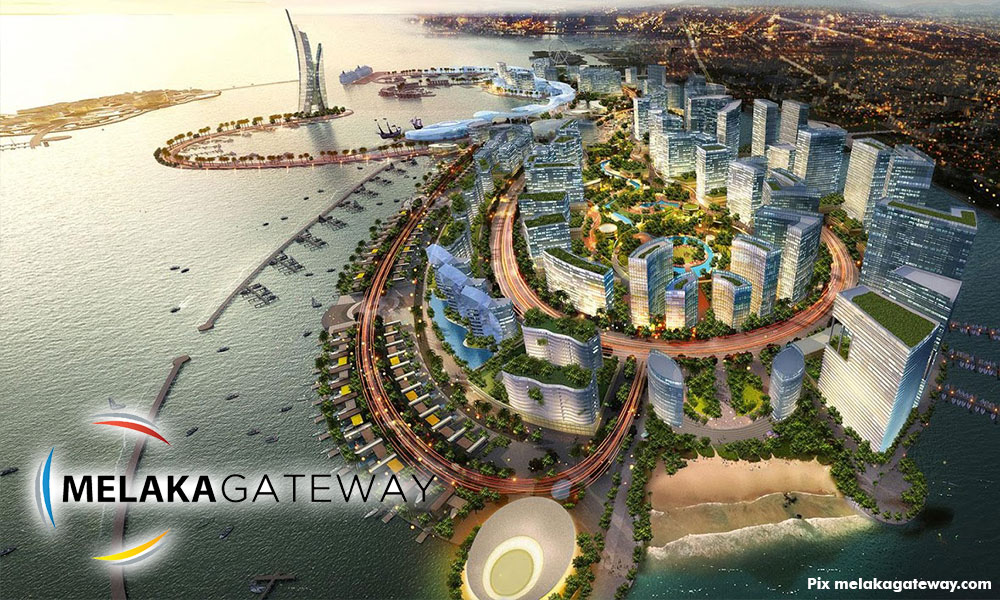
Launched by then prime minister Najib Abdul Razak in 2014, the RM43 billion Melaka Gateway project covering 246.45 hectares aimed to create three artificial islands to host, among others, a deep-sea port, cruise and container terminals, marinas, shipbuilding and repair services, maritime industrial park, hotels and condominiums.
KAJ Development was seen to be influential in bringing in investments from China.
In November 2015, then China's transport minister Yang Chuantang visited the Melaka Gateway site and hailed it as a sign of Malaysia's support for Beijing's Belt and Road Initiative.
Later that month, then Chinese premier Li Keqiang was also briefed about the project during a visit.
By September 2016, KAJ Development signed a memorandum of understanding with Powerchina International Group Limited, a subsidiary of the state-owned Power Construction Corporation of China, to jointly develop the Melaka Gateway project.
But in 2017, things started to go downhill.
The troubled project struggled to get off the ground under then Malacca chief minister Idris Haron and was subjected to a review under his successor Adly Zahari in 2018. The project was terminated under chief minister Sulaiman Md Ali in 2020 after KAJ Development failed to complete the reclamation works on time.
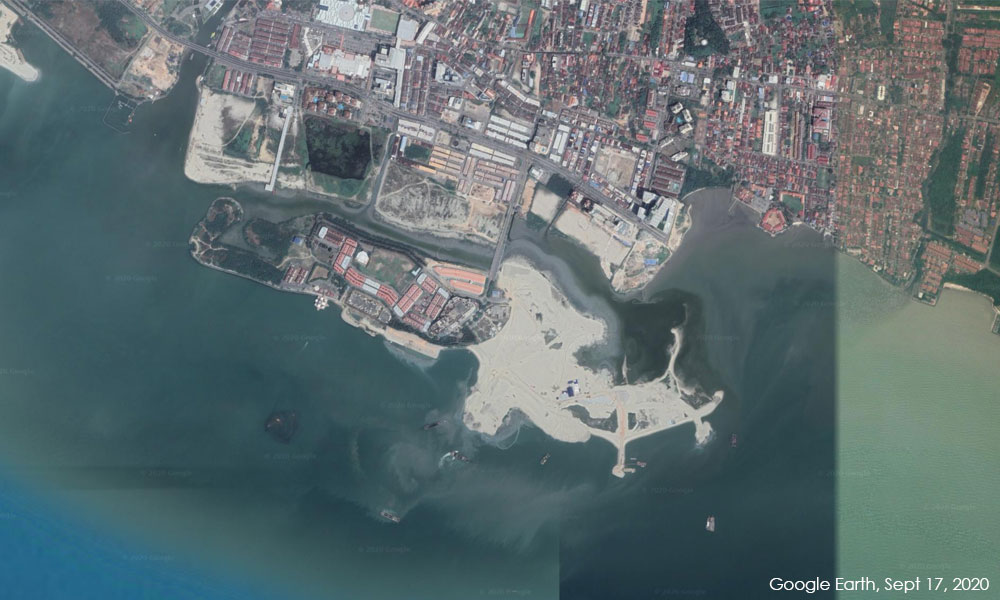
KAJ Development then sued the Malacca government but was unsuccessful.
Politics at play
Interestingly, despite losing the court case, KAJ Development was reinstated in March this year as the Melaka Gateway project developer.
The Melaka Gateway project is now part of the Malacca Waterfront Economic Zone which involves an expanded reclamation effort involving an area along 33km of Malacca's coastline.
KAJ Development's reinstatement was announced by Malacca exco in charge of industry and investment Rauf Yusoh on March 9. Sulaiman, who terminated the firm, was notably absent.
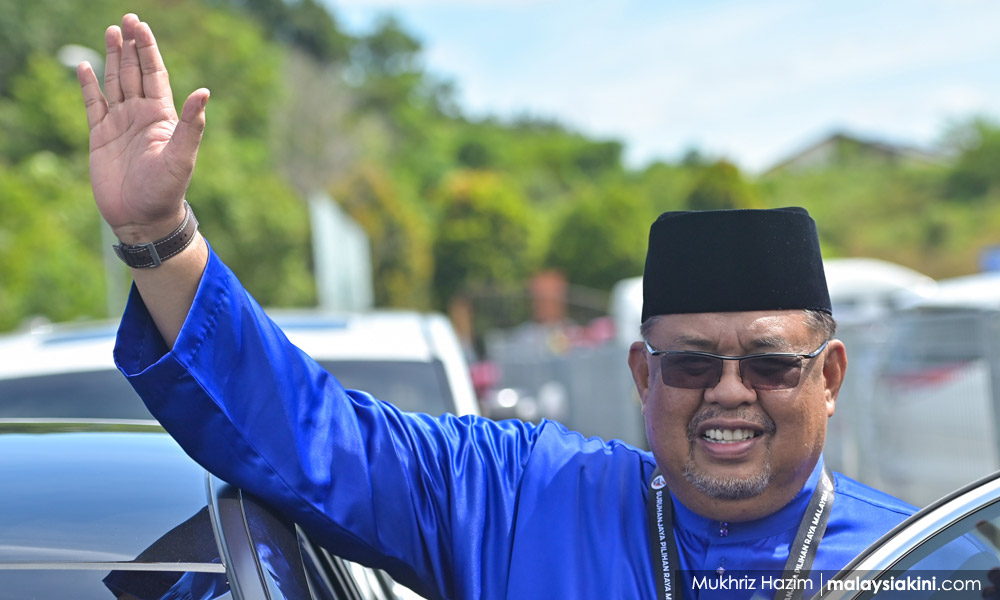
Less than a week later, renewed speculation emerged of a rift between Sulaiman and Rauf, who as the Malacca Umno chief, outranks the chief minister in the party hierarchy.
Sulaiman was reportedly frustrated that his decisions were being overruled despite being the chief minister, a claim that had persisted since his first term in 2020.
Notably, Rauf, as the state speaker in October 2021, had broken convention by announcing the dissolution of the state assembly to pave the way for the Malacca polls, even though the dissolution was done on the chief minister's advice.
Rauf, throughout the state election campaign, had to repeatedly deny he was controlling Sulaiman and the claims continued even after Sulaiman led BN to a landslide victory in the November 2021 Malacca polls.
But for KAJ Development, BN's strong return in Malacca has been a boon for the firm, and at least for Tun Tse, things are also looking up for the Maharani Energy Gateway project in neighbouring Johor.
State Umno chief Hasni Mohammad led BN to a landslide victory in the March 2022 Johor polls but could not return as the menteri besar after failing to receive assent from the Johor ruler.
Instead, the Johor royalty favoured another candidate - Onn Hafiz Ghazi - who is the great-grandson of Umno founder Onn Jaafar, grandson of former prime minister Hussein Onn and nephew to ex-prime minister Najib Abdul Razak and Defence Minister Hishammuddin Hussein.
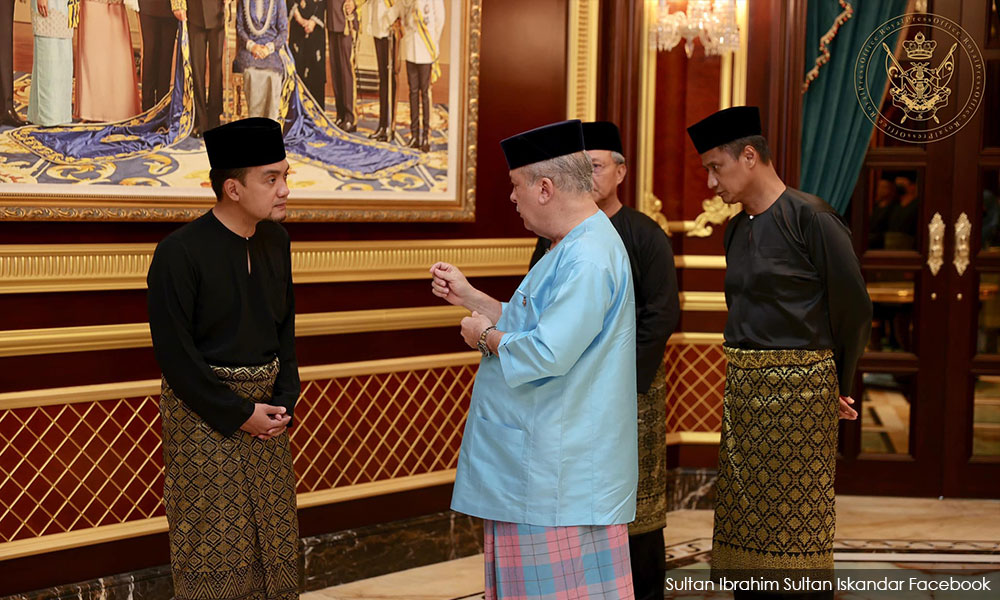
Under Hasni, the state government had given the Maharani Energy Gateway project the necessary land approvals and made changes to the Johor Structure Plan 2030 to accommodate the project.
During the Johor election campaign, Hasni said his government had yet to decide on the final approval but promised there would be due process.
Onn Hafiz, who was eventually sworn in as the menteri besar replacing Hasni, indicated in the Johor state assembly that the project would proceed, describing it as among the catalyst projects that would strengthen the economy beyond the heart of Johor.
In a state assembly written reply to Maharani assemblyperson Abdul Aziz Talib on June 21, the Johor government said the Maharani Energy Gateway would have an economic multiplier effect and transform Muar into a regional energy hub.
Sultan holds direct stake
Since Malaysiakini highlighted the project in March, the shareholding composition of Maharani Energy Gateway Sdn Bhd (MEGSB), the firm in charge of the development, has witnessed changes.
Previously, MEGSB was 55 percent owned by D Marine Industries Sdn Bhd and 45 percent owned by K Energy Sdn Bhd.
Sultan Ibrahim owned 70 percent in D Marine Industries Sdn Bhd, while Daing owned 30 percent.
This translated to an effective stake of 38.5 percent for the Johor ruler and 16.5 percent for Daing in MEGSB.
However, D Marine Industries Sdn Bhd had since been removed as a shareholder, according to an updated filing with the Companies Commission of Malaysia on May 18.
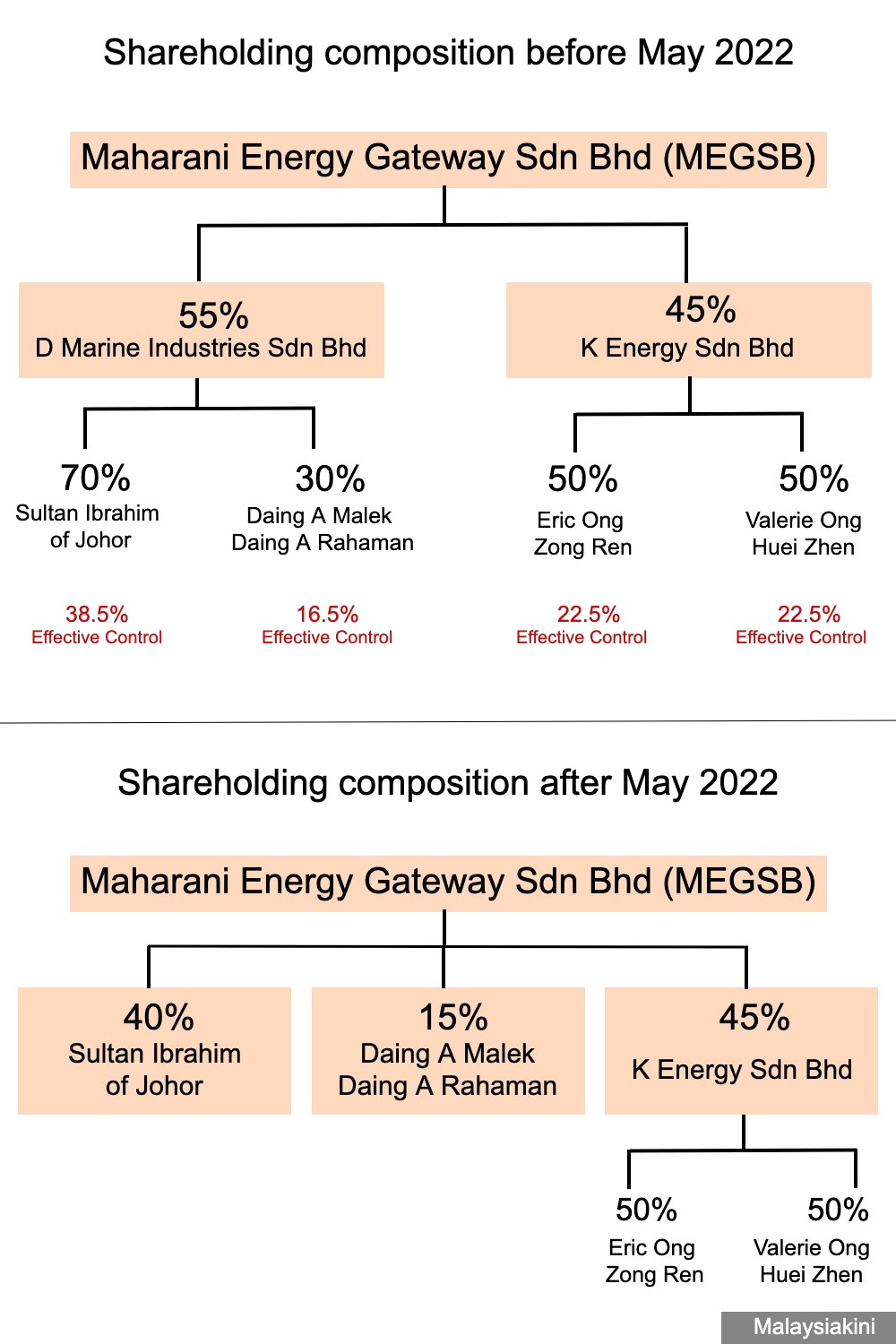
Instead, Sultan Ibrahim and Daing are now direct shareholders in MEGSB without going through an intermediary.
Sultan Ibrahim's stake increased from 38.5 percent to 40 percent, while Daing's holding was reduced from 16.5 percent to 15 percent.
K Energy's stake in MEGSB remained unchanged.
The Maharani Energy Gateway aims to create an energy hub and deepsea port, which involves the creation of three artificial islands covering an area of 1,295 hectares.
The project, with a gross value of RM99 billion over 10 years, promised to create 26,769 jobs but local fisherfolk fear their livelihoods would be impacted on top of environmental concerns.
Its promises are also a reminder of the lofty goals of another mega reclamation project in the state - the Forest City, another project involving the Johor royalty, which has now been described as a "ghost town". - Mkini



No comments:
Post a Comment
Note: Only a member of this blog may post a comment.